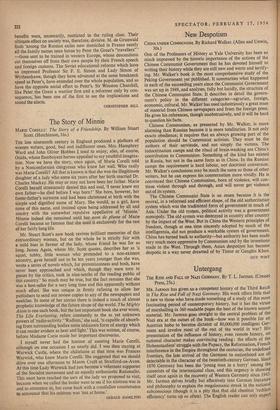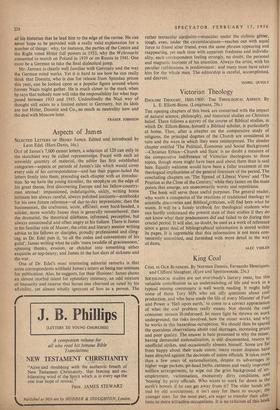Untergang
THE RISE AND FALL OF NAZI GERMANY. By T. L. Jarman. (Cresset Press, 25s.) MR. JARMAN has given us a competent history of the Third Reich in The Rise and Fall of Nazi Germany. His work offers little that is new to those who. have made something of a study of this most fascinating period of contemporary history, but it has the virtue of marshalling in 360 readable pages the best of the known source material. Mr. Jarman goes straight to the central problem of the Nazi era at the outset of the book—how was it possible for an Austrian hobo to become dictator of 80,000,000 intelligent Ger- mans and involve most of the rest of the world in war? His presentation of the influence of history, even remote history, on national character makes convincing reading : the effects of the Hohenstaufens' struggle with the Papacy, the Reformation, French interference in the Empire throughout the centuries, the undefined frontiers, the late arrival of the Germans to nationhood are all detectable in the character of the twentieth-century German. Since 1870 Germany has been the 'young man in a hurry' among the careerists of the international class, and this urgency is showing itself once again in the recovery of Western Germany since 1945. Mr. Jarman delves briefly but effectively into German literature and philosophy to explain the megalomanic streak in the national subconscious (though it is a pity, that that old chestnut 'ruthless efficiency' turns up so often). The English reader can only expect
of his historian that he lead him to the edge of the ravine. He can never hope to be provided with a really valid explanation for a number of things: why, for instance, the parties of the Centre and the Right voted Hitler full powers in 1933, why the Wehrmacht consented to march on Poland in 1939 or on Russia in 1941. One must be a German to take the final dialectical jump.
Mr. Jarman is clearly well familiar with Germany and the way the German mind works. Yet it is hard to see how he can really think that Doenitz, who is due for release from Spandau prison this year, can be looked upon as a popular figure around whom former Nazis might gather. He is much closer to the mark when he says that nobody now will take the responsibility for what hap- pened between 1933 and 1945. Undoubtedly the Nazi way of thought still exists to a limited extent in Germany, but its idols are not Hitler, Doenitz and Co., so much as neutrality now and the deal with Moscow later.
FRASER JOHNSON



































 Previous page
Previous page